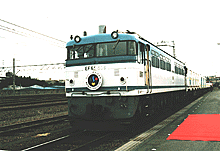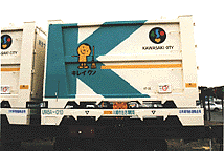

Three cities have begun transporting garbage and industrial waste from collection points to disposal sites by freight train. The scheme is a boon both for municipal governments-transporting garbage by train rather than truck not only saves taxpayers' money but also involves lower environmental costs and is not subject to traffic conditions-and for the Japan Freight Railway Company, since the garbage runs mean additional operating revenues. JR Freight is doing its best to sell more communities on the concept as a new use for its freight trains.
JR Takes the Initiative
The garbage trains got on track at the initiative of JR Freight, which has finished in the red for the past two years due to the adverse effects of the prolonged economic slowdown on the traffic of goods and to intense competition from trucks and other rivals. Anxious to tap a new source of demand, JR executives set out to persuade communities of the advantages of transporting their garbage by train. They adopted this tack because the amount of garbage generated tends to be stable regardless of the vicissitudes of the economy and because the job is well suited to the characteristics of a railroad, which is able to transport large volumes of freight of given dimensions on a fixed schedule. Although it is difficult, generally speaking, for a railroad to turn a profit moving freight less than 50 kilometers, garbage runs as short as 10 kilometers hold out the prospect of profitability because a large volume of garbage can be expected daily.
All Aboard in Kawasaki
Garbage runs were started in three cities in October. In Kawasaki, for example, garbage and industrial wastes collected around the northern part of the city are packed into specially designed containers and taken to Kajigaya Freight Terminal, where they are loaded on board a train that hauls them to Suehiro Station, approximately 23 kilometers away. There the containers are unloaded back onto trucks, which transport them to a nearby disposal center. Plans call for the 16-car train to make one round trip each day, carrying some 8.5 tons of garbage per year. By opting for rail instead of road, Kawasaki will save ¥200 million annually in transportation costs.
JR Freight is actively seeking to interest other communities in its garbage train scheme. One of these is Saitama Prefecture, which is drafting plans to build a new centrally located metropolis. JR has proposed to carry the soil left over by the project to the northern part of the prefecture, where it can be used in the development of industrial parks or the construction of river dikes. Since transporting all of this soil by truck will likely snarl traffic on the prefecture's single-lane national roads, Saitama has responded enthusiastically, and the two sides are reportedly working out the costs.
(The above article, edited by Japan Echo Inc., is based on domestic Japanese news sources. It is offered for reference purposes and does not necessarily represent the policy or views of the Japanese Government.)